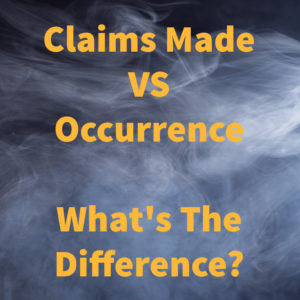Claims Made Insurance Policy vs Occurrence Insurance Policy?
What is the difference between a claims made insurance policy and an occurrence insurance policy?
 Different types of coverage are commonly written on different types of policy forms. The most popular form is an occurrence policy, such as most general liability insurance policies. Certain policies such as cyber insurance, pollution libility insurance, professional insurance (E&O), and employment practices liability insurance (EPLI) policies are more commonly written on a claim made insurance form.
Different types of coverage are commonly written on different types of policy forms. The most popular form is an occurrence policy, such as most general liability insurance policies. Certain policies such as cyber insurance, pollution libility insurance, professional insurance (E&O), and employment practices liability insurance (EPLI) policies are more commonly written on a claim made insurance form.
It is imperative that you know what type of policy form that you have, especially when looking to replace a policy because going from a claims made form to an occurrence form could leave you with an unexpected gap in coverage and could result in an unpaid claim.
What is an occurrence form?
- Generally, an occurrence form will respond if the injury or damage occurred during the policy period, regardless of when the claim is delivered.
- Occurrence coverage applies to a loss
- If it occurred during the policy term
- The loss took place in a covered territory
- The loss arises out of the insured’s work or premises
What is a Claims Made Insurance Form?
- The trigger for a claims made insurance form is when the claim is reported. Insurance coverage usually only applies during the policy period and subsequent extended reporting periods.
- The 4 dates to remember with a claim made policy
- The date the injury occurs
- The date the work was performed
- The policy effective date
- The retroactive date. This is a huge one! The retroactive dates is typically the date on or after which the work that caused the loss must be performed.
- The claim made insurance coverage usually applies to a loss if:
- The loss took place in the coverage territory arising out of the insured’s work
- The insured’s work did not occur before the retroactive date shown on the declaration page or after the end of the policy period
- The claim or suit is first made against insured during the policy period
- A claims made insurance policy typically includes an automatic extended reporting period (ERP), or commonly referred to as a Tail. This period only provides additional time to report a claim that occurred between the retro date and the policy term. It does not provide for an extension of coverage.
What happen if you wish to replace your coverage with another company?
- If you go from a claim made insurance to an occurrence insurance policy, you would need to purchase an extended reporting period from the claims made policy.
- If you renew the coverage with another carrier on a claims made form, you need to keep the retroactive date from the expiring policy. Failing to do this it could significantly reduce your coverage.
There are advantages and disadvantages to both coverage forms. A claims made policy may be lower in price initially. But as the coverage continues and the retro date grows older, the premium could increase over time.
With occurrence insurance coverage, the limits set for a policy remain the same, regardless of when the claim is made. But with a claims made insurance policy, there may be broader coverage or higher limits over time.
Typically, cyber, pollution, professional liability and employment practices liability are claims made because the job might be completed today but the claim does not occur for several years later.
For example, in 2000 you might have had a $1 million dollar limit when you completed the job, but today you have $5 million limit, a covered claim being reported today, even though the work was done in 2000 would then have $5 million dollars of coverage afforded rather than the $1 million it would have had if the policy was an occurrence.
Knowing the policy form that you have when shopping for replacement coverage is crucial. You must make sure that you match not just the limits, but the retroactive date as well.
Closing your business?
If you have a claims made insurance policy you need to purchase an extended reporting period. This allows time for claims that occurred from the work that you did since the retro active date to be reported.
